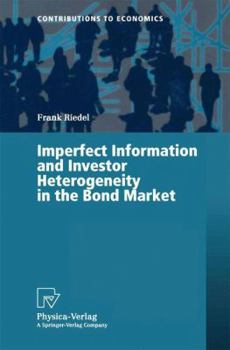Imperfect Information and Investor Heterogeneity in the Bond Market
Real world investors differ in their tastes and attitudes and they do not have, in general, perfect information about the future prospects of the economy. Most theoretical models, however, assume to the contrary that investors are homogeneous and perfectly informed about the market. In this book, an attempt is made to overcome these shortcomings. In three different case studies, the effect of heterogeneous time preferences, heterogeneous beliefs and...
Format:Paperback
Language:English
ISBN:3790812471
ISBN13:9783790812473
Release Date:November 1999
Publisher:Physica-Verlag
Length:118 Pages
Weight:0.43 lbs.
Dimensions:0.3" x 6.1" x 9.2"
Customer Reviews
0 rating





